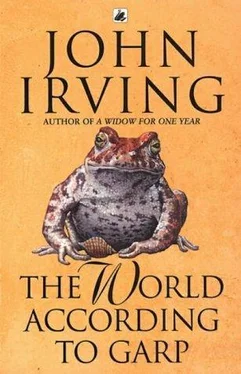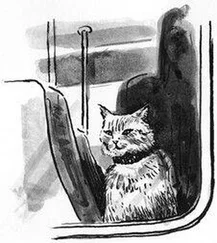Alice encouraged Garp to stop the silly notes. He could talk if he tried, if he wasn't so vain about how he sounded. If she could talk, certainly he could spit the words out, Alice reasoned—teeth wired together, delicate tongue, and all; he could at least try.
“Alish,” Garp said.
“Yeth,” said Alice. “That'th my name. What'th yours?”
“Arp,” Garp managed to say.
Jenny Fields, passing whitely to another room, shuddered like a ghost and moved on.
“I mish him,” Garp confessed to Alice.
“You mith him, yeth, of courth you do,” said Alice, and she held him while he cried.
It was quite some time after the Fletchers left when Helen came to Garp's room in the night. She was surprised to find him lying awake, because he was listening to what she'd heard, too. It was why she couldn't sleep.
Someone, one of Jenny's late arrivals—a new guest—was taking a bath. First the Garps had heard the tub being drawn, then they'd heard the plunking in the water—now the splashing and soapy sounds. There was even a little light singing, or the person was humming.
They remembered, of course, the years Walt had washed himself within their hearing, how they would listen for any telltale slipping sounds, or for the most frightening sound of all—which was no sound. And then they'd call, “Walt?” And Walt would say, “What?” And they would say, “Okay, just checking!” To make sure that he hadn't slipped under and drowned.
Walt liked to lie with his ears underwater, listening to his fingers climbing the walls of the tub, and often he wouldn't hear Garp or Helen calling him. He'd look up, surprised, to see their anxious faces suddenly above him, peering over the rim of the tub. “I'm all right,” he'd say, sitting up.
“Just answer , for God's sake, Walt,” Garp would tell him. “When we call you, just answer us.”
“I didn't hear you,” Walt said.
“Then keep your head out of the water,” Helen said. “But how can I wash my hair?” Walt asked.
“That's a lousy way to wash your hair, Walt,” Garp said. “Call me. I'll wash your hair.”
“Okay,” said Walt. And when they left him alone, he'd put his head underwater again and listen to the world that way.
Helen and Garp lay beside each other on Garp's narrow bed in one of the guest rooms in one of the garrets at Dog's Head Harbor. The house had so many bathrooms—they couldn't even be sure which bathroom they were listening to, but they listened.
“It's a woman, I think,” Helen said.
“Here?” Garp said. “Of course it's a woman.”
“I thought at first it was a child,” Helen said.
“I know,” Garp said.
“The humming, I guess,” Helen said. “You know how he used to talk to himself?”
“I know,” Garp said.
They held each other in the bed that was always a little damp, so close to the ocean and with so many windows open all day, and the screen doors swinging and banging.
“I want another child,” said Helen.
“Okay,” Garp said.
“As soon as possible,” Helen said.
“Right away,” said Garp. “Of course.”
“If it's a girl,” Helen said, “we'll name her Jenny, because of your mother.”
“Good,” said Garp.
“I don't know, if it's a boy,” said Helen.
“Not Walt,” Garp said.
“Okay,” Helen said.
“Not ever another Walt,” said Garp. “Although I know some people do that.”
“I wouldn't want to,” Helen said.
“Some other name, if it's a boy,” Garp said.
“I hope it's a girl,” said Helen.
“I won't care,” Gart said.
“Of course. Neither will I, really,” said Helen.
“I'm so sorry,” Garp said; he hugged her.
“No, I'm so sorry,” she said.
“No, I'm so sorry,” said Garp.
“ I am,” Helen said.
“ I am,” he said.
They made love so carefully. Helen imagined that she was Roberta Muldoon, fresh out of surgery, trying out a brand-new vagina. Garp tried not to imagine anything.
Whenever Garp began imagining, he only saw the bloody Volvo. There were Duncan's screams, and outside he could hear Helen calling; and someone else. He twisted himself from behind the steering wheel and kneeled on the driver's seat; he held Duncan's face in his hands, but the blood would not stop and Garp couldn't see everything that was wrong.
“It's okay,” he whispered to Duncan. “Hush, you're going to be all right.” But because of his tongue, there were no words—only a soft spray. Duncan kept screaming, and so did Helen, and someone else kept groaning—the way a dog dreams in its sleep. But what did Garp hear that frightened him so? What else ?
“It's all right, Duncan, believe me,” he whispered, incomprehensibly. “You're going to be all right.” He wiped the blood from the boy's throat with his hand; nothing at the boy's throat was cut, he could see. He wiped the blood from the boy's temples, and saw that they were not bashed in. He kicked open the driver's-side door, to be sure; the door light went on and he could see that one of Duncan's eyes was darting. The eye was looking for help, but Garp could see that the eye could see. He wiped more blood with his hand, but he could not find Duncan's other eye. “It's okay,” he whispered to Duncan, but Duncan screamed even louder.
Over his father's shoulder, Duncan had seen his mother at the Volvo's open door. Blood streamed from her gashed nose and her sliced tongue, and she held her right arm as if it had broken off somewhere near her shoulder. But it was the fright in her face that frightened Duncan. Garp turned and saw her. Something else frightened him.
It was not Helen's screaming, it was not Duncan's screaming. And Garp knew that Michael Milton, who was grunting, could grunt himself to death—for all Garp cared. It was something else. It was not a sound. It was no sound. It was the absence of sound.
“Where's Walt?” Helen said, trying to see into the Volvo. She stopped screaming.
“Walt!” cried Garp. He held his breath. Duncan stopped crying.
They heard nothing. And Garp knew Walt had a cold you could hear from the next room—even two rooms away, you could hear that wet rattle in the child's chest.
“Walt!” they screamed.
Both Helen and Garp would whisper to each other, later, that at that moment they imagined Walt with his ears underwater, listening intently to his fingers at play in the bathtub.
“I can still see him,” Helen whispered, later.
“All the time,” Garp said. “I know.”
“I just shut my eyes,” said Helen.
“Right,” Garp said. “I know.”
But Duncan said it best. Duncan said that sometimes it was as if his missing right eye was not entirely gone. “It's like I can still see out of it, sometimes,” Duncan said. “But it's like memory, it's not real—what I see.”
“Maybe it's become the eye you see your dreams with,” Garp told him.
“Sort of,” Duncan said. “But it seems so real.”
“It's your imaginary eye,” Garp said. “That can be very real.”
“It's the eye I can still see Walt with,” Duncan said. “You know?”
“I know,” Garp said.
Many wrestlers' children have hardy necks, but not all the children of wrestlers have necks that are hardy enough.
For Duncan and Helen, now, Garp seemed to have an endless reservoir of gentleness; for a year, he spoke softly to them; for a year, he was never impatient with them. They must have grown impatient with his delicacy. Jenny Fields noticed that the three of them needed a year to nurse each other.
In that year, Jenny wondered, what did they do with the other feelings human beings have? Helen hid them; Helen was very strong. Duncan saw them only with his missing eye. And Garp? He was strong, but not that strong. He wrote a novel called The World According to Bensenhaver , into which all his other feelings flew.
Читать дальше












